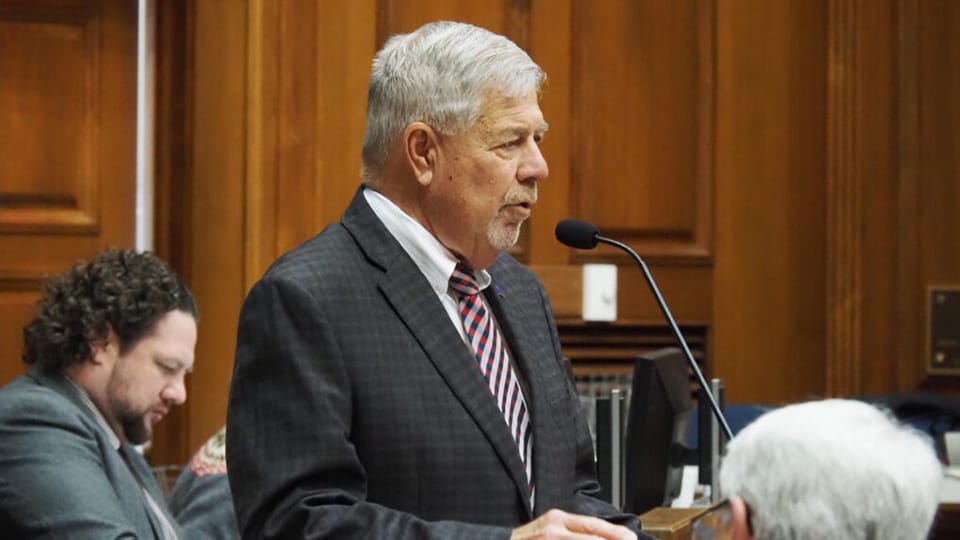Indiana public retirees win 13th check, bonuses
Subscriber Benefit
As a subscriber you can listen to articles at work, in the car, or while you work out. Subscribe Now
Tens of thousands of Hoosier public retirees are guaranteed to get pension benefit bonuses every year — including a 13th check for all by October — under a negotiated final draft of legislation headed to Gov. Eric Holcomb’s desk.
The compromise comes after weeks of tussling over policy goals and years of differences in preferred approaches to additional benefits.
“I’m thrilled that we’re going to help so many people,” Rep. Bob Cherry, R-Greenfield, told the Capital Chronicle. Two women even approached him at church Sunday over the then-uncertain legislation to say they “really needed” the check, Cherry said.
He has long pushed for the retiree aid and this is his last session.
Last year, lawmakers approved no adjustment, angering many public retirees. The bonuses supplement flat retirement benefits that don’t keep up with inflation.
The House approved it unanimously, 98-0, while the Senate passed it 44-3. Republican Sens. Eric Bassler, Aaron Freeman and Ryan Mishler voted in opposition; the latter two have cited financial concerns.
The House has traditionally supported ad hoc perks, and filed legislation to that end. Senators, on the other hand, have long sought a lasting solution that doesn’t require annual or biannual legislative action, and proposed such a plan.
But the chambers appeared skeptical of each others’ bills.
The House didn’t hear the Senate’s long-term plan before a deadline, killing it. In response, the Senate added the House’s ad hoc bonus to a committee calendar last-minute — only to strip the text and instead insert the chamber’s own briefly dead bill.
The House didn’t agree to those changes. Lawmakers from both chambers went into conference committee to hammer out a compromise — and public retirees came out with both.
What to expect
House Bill 1004 now establishes a hybrid mechanism offering annual 13th checks to public employees retired before July 1, 2025. Those retired after that date would get 1% cost-of-living adjustments (COLAs).
To pay for the plan, the legislation removes a previous 1% payroll-based surcharge cap and instead allows the Indiana Public Retirement System’s board to raise surcharge rates annually to, at most, 0.1% of payroll from the previous year. And it bars the board from lowering rates.
But to tide retirees over until the long-term plan goes into force, the legislation also gives one more ad hoc check for this year. It’s due by October 1, 2024.
Most retirees — public school teachers, state employees and others — would receive checks between $150 and $450, based on years of service. That would now include those with between five and 10 years, who previously were only eligible if they were getting disability-related retirement benefits.
Dedicated funding in reserve accounts exists to cover the cost. A fiscal analysis composed for the original House version — which didn’t include those able-bodied retirees with less experience, slightly narrowing the pool of recipients — estimated a $33 million price tag.
State police would be eligible for a 1% share of the maximum pension for a trooper with certain years of service, paid from the budget-funded State Police Pension Trust Fund. That’s expected to cost about $400,000, according to the fiscal analysis.
The legislation also now requires Indiana’s treasurer to set up separate reserve accounts for two state police retirement funds. Their ad hoc benefit will come out of a trust fund this year.
Senate leaders previously said they didn’t believe the state could afford both the ad hoc and long-term plan at the same time.
“We have to build the fund up,” Mishler, who chairs the powerful Appropriations Committee, told reporters last week. “If you do a 13th check, you’re going to prolong the permanent fix. That’s the trade-off.”
He also feared public employers would struggle to afford the higher surcharge rates needed to finance both in tandem.
House leaders, meanwhile, have maintained both are possible.
The Indiana Public Retirement System (INPRS) confirmed by email last week that lawmakers could do both “if all actuarial assumptions are met” but warned that it hasn’t examined the risks Indiana would face if finances failed to meet those assumptions.
Moving forward with both approaches would increase INPRS’ unfunded liabilities by $779 million, spokesman Dimitri Kyser wrote. That would also decrease the funded statuses for the 1996 Teachers Retirement Fund and the Public Employees Retirement Fund by about 3% and 2%, respectively, he said.
The legislation additionally boosts oversight over “delinquent” political subdivisions that aren’t appropriately funding their employee retirement plans. It would require representatives from those subdivisions to present remediation plans to a pension-focused interim committee.
The Indiana Capital Chronicle is an independent, not-for-profit news organization that covers state government, policy and elections.
